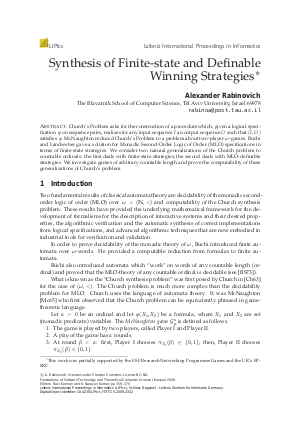Synthesis of Finite-state and Definable Winning Strategies
Author Alexander Rabinovich
-
Part of:
Volume:
IARCS Annual Conference on Foundations of Software Technology and Theoretical Computer Science (FSTTCS 2009)
Part of: Series: Leibniz International Proceedings in Informatics (LIPIcs)
Part of: Conference: IARCS Annual Conference on Foundations of Software Technology and Theoretical Computer Science (FSTTCS) - License:
 Creative Commons Attribution-NonCommercial-NoDerivs 3.0 Unported license
Creative Commons Attribution-NonCommercial-NoDerivs 3.0 Unported license
- Publication Date: 2009-12-14
File

PDF
LIPIcs.FSTTCS.2009.2332.pdf
- Filesize: 126 kB
- 12 pages
Document Identifiers
Subject Classification
Keywords
- Games of ordinal length
- Church Synthesis Problem
- Monadic Logic
- Composition Method
Metrics
- Access Statistics
-
Total Accesses (updated on a weekly basis)
0Document
0Metadata
Abstract
Church's Problem asks for the construction of a procedure which, given a logical specification $\varphi$ on sequence pairs, realizes for any input sequence $I$ an output sequence $O$ such that $(I,O)$ satisfies $\varphi$. McNaughton reduced Church's Problem to a problem about two-player$\omega$-games. B\"uchi and Landweber gave a solution for Monadic Second-Order Logic of Order ($\MLO$) specifications in terms of finite-state strategies. We consider two natural generalizations of the Church problem to countable ordinals: the first deals with finite-state strategies; the second deals with $\MLO$-definable strategies. We investigate games of arbitrary countable length and prove the computability of these generalizations of Church's problem.
Cite As Get BibTex
Alexander Rabinovich. Synthesis of Finite-state and Definable Winning Strategies. In IARCS Annual Conference on Foundations of Software Technology and Theoretical Computer Science. Leibniz International Proceedings in Informatics (LIPIcs), Volume 4, pp. 359-370, Schloss Dagstuhl – Leibniz-Zentrum für Informatik (2009)
https://doi.org/10.4230/LIPIcs.FSTTCS.2009.2332
BibTex
@InProceedings{rabinovich:LIPIcs.FSTTCS.2009.2332,
author = {Rabinovich, Alexander},
title = {{Synthesis of Finite-state and Definable Winning Strategies}},
booktitle = {IARCS Annual Conference on Foundations of Software Technology and Theoretical Computer Science},
pages = {359--370},
series = {Leibniz International Proceedings in Informatics (LIPIcs)},
ISBN = {978-3-939897-13-2},
ISSN = {1868-8969},
year = {2009},
volume = {4},
editor = {Kannan, Ravi and Narayan Kumar, K.},
publisher = {Schloss Dagstuhl -- Leibniz-Zentrum f{\"u}r Informatik},
address = {Dagstuhl, Germany},
URL = {https://drops.dagstuhl.de/entities/document/10.4230/LIPIcs.FSTTCS.2009.2332},
URN = {urn:nbn:de:0030-drops-23320},
doi = {10.4230/LIPIcs.FSTTCS.2009.2332},
annote = {Keywords: Games of ordinal length, Church Synthesis Problem, Monadic Logic, Composition Method}
}
